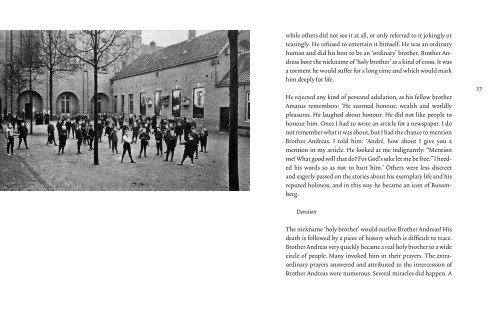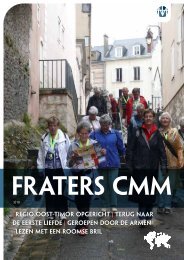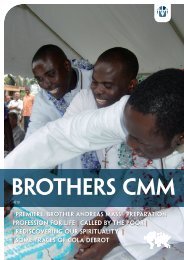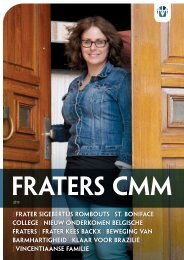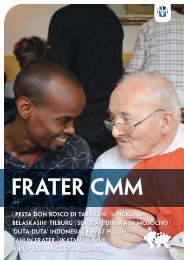frater Andreas Engels:frater Andreas - Fraters - CMM Brothers
frater Andreas Engels:frater Andreas - Fraters - CMM Brothers
frater Andreas Engels:frater Andreas - Fraters - CMM Brothers
You also want an ePaper? Increase the reach of your titles
YUMPU automatically turns print PDFs into web optimized ePapers that Google loves.
14<br />
which would serve a number of needs in his diocese. The primary<br />
need was to service the great demand for Catholic education, but<br />
there was also a need for other forms of education as well as care<br />
for the poor and those discriminated against. The objectives were<br />
comparable to those that other recently founded congregations of<br />
brothers had set themselves. Zwijsen’s idea was not an original<br />
one; communities of brothers of mercy were also at work elsewhere,<br />
in several French, Belgian and Dutch cities. Some years earlier,<br />
in 1832, when he was still chaplain in Tilburg, Zwijsen had<br />
founded a congregation of sisters: the Sisters of Charity of Our<br />
Lady Mother of Mercy. This congregation focused successfully on<br />
local education and care of the sick, but was less successful at<br />
working with older boys. It was thus quickly followed by the congregation<br />
of brothers. Although it did not grow as rapidly as the<br />
congregation of sisters, by 1859, the year when Jan van den Boer<br />
became a novice and was given the name Brother <strong>Andreas</strong>, it had<br />
more than one hundred brothers. They worked at a few schools in<br />
Tilburg, but had also started some schools elsewhere in the<br />
province of Brabant and even across the border in Belgium.<br />
Brother <strong>Andreas</strong> trained as a teacher and was appointed at Huize<br />
Ruwenberg, a new and large boarding school in Sint-Michiels -<br />
gestel, in 1861. He was to work at this prestigious institute for<br />
over fifty years and taught many children from influential<br />
Catholic families. His work as a tutor and teacher was busy and<br />
varied. Brother <strong>Andreas</strong> taught various classes, including the art<br />
of handwriting and Dutch and later obtained additional teaching<br />
certificates in French and German. He was good at languages and<br />
he would use them extensively, not only in education. For example,<br />
in his free time he translated a great many children’s books<br />
from German and ensured that the level of French, one of the official<br />
languages of communication in the congregation at the<br />
time, was kept to a high standard. In addition to the children, he<br />
also taught those brothers who were less familiar with these languages.<br />
Besides education there were many other tasks that filled<br />
a brother’s day, such as supervising the boys when they got up in<br />
the morning, when playing in the court yard, during recreation<br />
time and in the dormitories. In addition, there were always plenty<br />
of household chores to do, and the celebration of Mass and<br />
other daily religious practices.<br />
At first Brother <strong>Andreas</strong> worked in primary education, but he was<br />
soon entrusted with the care of the ‘Latinists’, boys in preparatory<br />
training to become priests. The congregation had set up the Latin<br />
class in the hope that some boys would opt to be trained as priests<br />
for the congregation, because until 1916 the congregation had<br />
priests as well as brothers. In practice this combination did not<br />
work very well and was not permanently approved by the church<br />
authorities. The idea was later dropped and the priests went to<br />
work elsewhere. However, when Brother <strong>Andreas</strong> worked at<br />
Ruwenberg, the seminary still existed. Between 1871 and 1900<br />
Brother <strong>Andreas</strong> supervised various priest student classes, first as<br />
a teacher and later also as their director. He found it easier to work<br />
with boys aged between twelve and eighteen rather than with<br />
younger children. His serious personality was better suited to<br />
boys who were aware of their vocation.<br />
15


